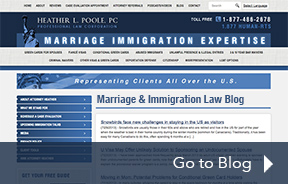Nonimmigrant (Temporary) Visas for Business
There are more than 20 different kinds of nonimmigrant visa names and types. Each is defined by Congress in the statute to meet a particular need of the U.S. economy. Some of these visas can be used for employment in the United States, under tightly regulated conditions.
These foreign nationals are allowed to enter the United States for temporary, specifically defined periods of time and in most cases must show intent to return to their home country at the end of their temporary stay.
Nonimmigrants with permission to work in the United States are either sponsored by a U.S. employer based on a specific job offer and must work only for that employer, or have work permission for specific objectives. (For example, students granted practical training in their field of study or professors and researchers working in international exchange programs.)
Most foreign nationals undergo at least two screening processes in order to come to the United States. The State Department Consular Officer decides whether the individual’s purpose in coming matches one of the approved categories, and whether the person meets all other eligibility criteria for admission (that is, they’re not a criminal, have not previously committed fraud, etc.) before issuing a visa to allow the individual to come to the United States. Upon arrival, all nonimmigrants are inspected by the USCIS to reconfirm their qualification for admission, and to determine the appropriate nonimmigrant classification and authorize a specific length of stay. Some employer-sponsored nonimmigrants must have USCIS approve a petition on their behalf, based on highly defined criteria, before even applying for their visa.
Some work-authorized categories are limited by annual levels (for example, H-1B professionals, and H-2B temporary or seasonal workers).
Typical Temporary Work Visas
There is a wide range of temporary visas, used for many different purposes, with validity periods ranging from a few days to several years. The USCIS must approve some in advance before being reviewed and issued by the State Department; others are only reviewed by the State Department. Visas may be granted to the principal applicant and to his or her dependents (spouse and minor children).
There is a difference between a visa and a status, although both are referred to in the same manner and with the same alphabetical designation (based on the respective section of the Immigration and Nationality Act). A visa is simply a document in the person’s passport. It serves as a “ticket” to ensure that a foreign national can board the airplane to the U.S. A person’s visa status is the category in which he or she is admitted to the United States and also determines the period of time he or she may remain. An individual’s visa status is granted by the USCIS once the applicant arrives at the border or a port of entry, and can be changed or extended by the USCIS at one of its remote Service Centers.
The different temporary visa categories are:
A: Diplomatic employees and their households
B: Business visitors (B-1) or tourists (B-2)
C: Aliens in Transit (pass-through at an airport or seaport)
D: Crewmember (air or sea)
E: Treaty-Investors or Treaty-Traders (from countries where we have a treaty of commerce and investment)
F: Students
G: Employees of International Organizations (IMF, OPIC, OAS, International Red Cross, etc.)
H: Temporary Workers. Can be professionals (H-1B), nurses (H-1C), agricultural workers (H-2A), temporary or seasonal workers (H-2B), or trainees (H-3)
I: Representatives of international media
J: Exchange visitors (educational exchange students, au pairs, graduate medical trainees, practical training students, professors and researchers, short-term scholars, camp counselors)
K: Fiancés and fiancées; spouses of U.S. citizens married abroad
L: Intracompany transferees (executives, managers, persons with proprietary knowledge)
M: Language and vocational students
N: NATO employees
O: Extraordinary ability aliens
P: Athletes, entertainment groups (such as orchestras) and support personnel
R: Religious workers
S: Criminal informants
T: Victims of international trafficking in persons
TN: NAFTA Professionals
U: Victims of criminal activity
V: Spouses and minor children of permanent residents who are waiting for green cards.
Q: Cultural exchange visitors (example: Smithsonian Folklife Festival participants)
Some of the above information was provided courtesy of the American Immigration Lawyers Association, of which Attorney Heather L. Poole is an active member and current Vice Chair for AILA’s Southern California Chapter. For more information on AILA, go to www.aila.org.







